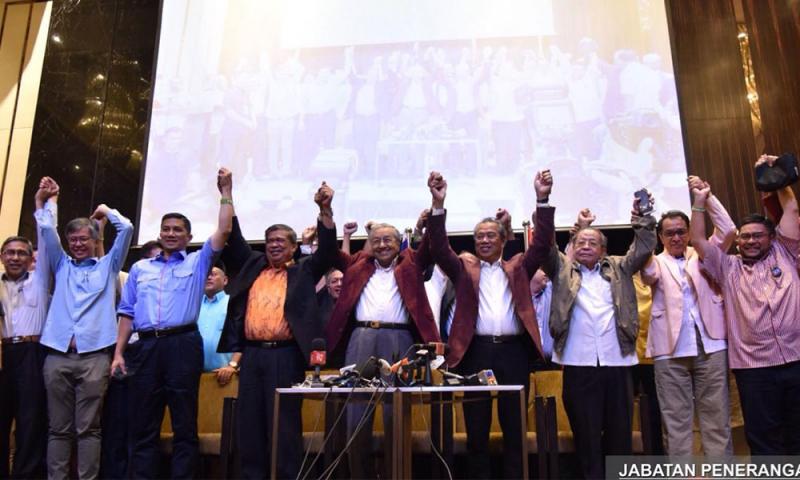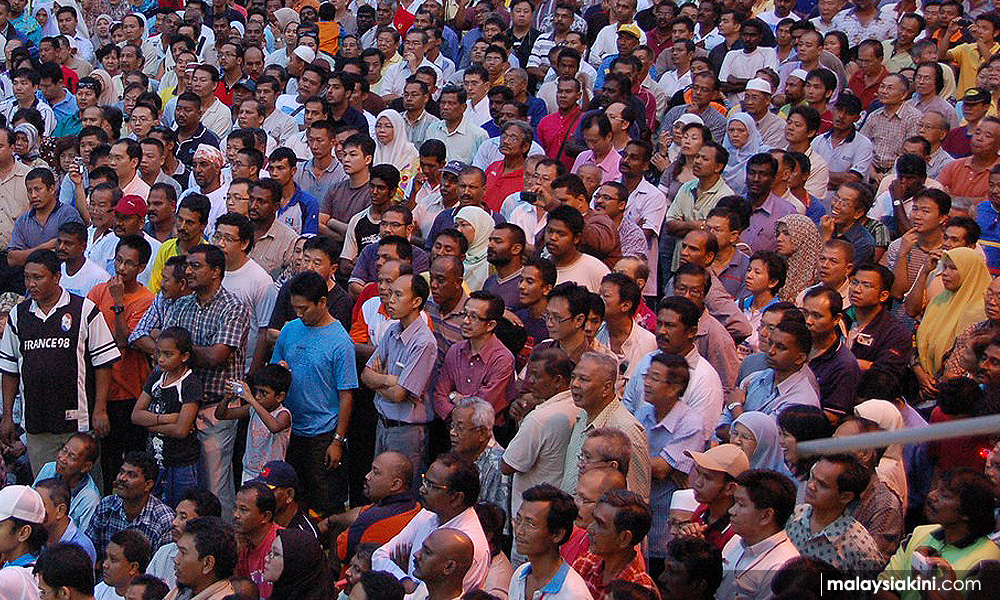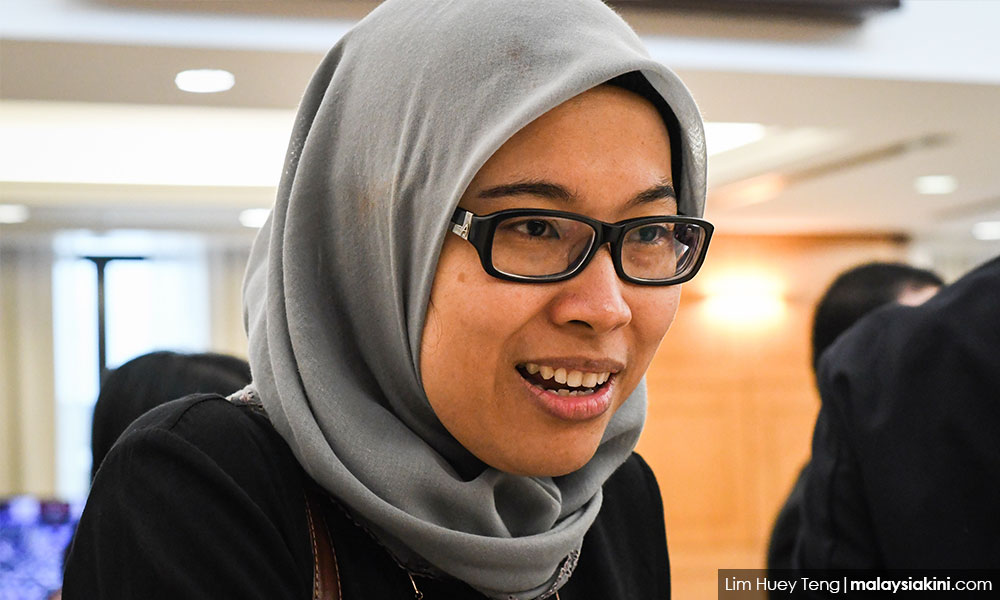
S Thayaparan
“The fall of one regime does not bring in a utopia. Rather, it opens the way for hard work and long efforts to build more just social, economic and political relationships and the eradication of other forms of injustices and oppression.”
COMMENT | A recently retired diplomat who worked for BN, Pakatan Harapan and limped along for Perikatan Nasional, posed the question which is the title of this piece.
We have to ask, who is doing the hoping, here? When Harapan political operatives talk about how Malaysians voted for “change” this was not really reflected in who the majority of Malaysians voted for.
However elections have consequences and the fact that Harapan could have carried out a reform agenda but chose not to, is now being framed as Harapan did not have much time or to blame Dr Mahathir Mohamad.
Keep in mind that Harapan political operatives were assuring everyone that they had methods to restrain the old maverick before the election. But you know what, and this is the dirty little secret, there were many Harapan non-Malay political operatives who actually approved of Mahathir and were sceptical of Anwar Ibrahim.
Harapan framed the dethroning of Umno/BN as some sort of apocalyptic showdown. When they were in power, they spent most of the time backtracking on their campaign promises and gaslighting the people who voted for them that all was kosher in the coalition.
Harapan blamed the Sheraton Move on the derailing of the reform agenda but this would only make sense if they were not walking back on reforms to the lead up to the Sheraton Move. This would mean the hard work and long efforts that Gene Sharp (folks should read his books) talks about.
The underlying motive of the plotters of the Sheraton Move was racial and religious in nature, in that the DAP was used (again) as the punching bag for Malay anxiety.
This meant that nobody really believed the New Malaysia propaganda. Keep in mind that Harapan was not a populist movement which was reflected in voter share.
When it comes to ketuanan politics, maybe a good voting chunk of the majority do not want to give up their ketuanan status.
Nobody wants to give up their special privileges, especially when those privileges sustain families and communities through the vagaries of a changing economic and geopolitical landscape.
“The fall of one regime does not bring in a utopia. Rather, it opens the way for hard work and long efforts to build more just social, economic and political relationships and the eradication of other forms of injustices and oppression.”
- Gene Sharp, "From Dictatorship to Democracy"
COMMENT | A recently retired diplomat who worked for BN, Pakatan Harapan and limped along for Perikatan Nasional, posed the question which is the title of this piece.
We have to ask, who is doing the hoping, here? When Harapan political operatives talk about how Malaysians voted for “change” this was not really reflected in who the majority of Malaysians voted for.
However elections have consequences and the fact that Harapan could have carried out a reform agenda but chose not to, is now being framed as Harapan did not have much time or to blame Dr Mahathir Mohamad.
Keep in mind that Harapan political operatives were assuring everyone that they had methods to restrain the old maverick before the election. But you know what, and this is the dirty little secret, there were many Harapan non-Malay political operatives who actually approved of Mahathir and were sceptical of Anwar Ibrahim.
Harapan framed the dethroning of Umno/BN as some sort of apocalyptic showdown. When they were in power, they spent most of the time backtracking on their campaign promises and gaslighting the people who voted for them that all was kosher in the coalition.
Harapan blamed the Sheraton Move on the derailing of the reform agenda but this would only make sense if they were not walking back on reforms to the lead up to the Sheraton Move. This would mean the hard work and long efforts that Gene Sharp (folks should read his books) talks about.
The underlying motive of the plotters of the Sheraton Move was racial and religious in nature, in that the DAP was used (again) as the punching bag for Malay anxiety.
This meant that nobody really believed the New Malaysia propaganda. Keep in mind that Harapan was not a populist movement which was reflected in voter share.
When it comes to ketuanan politics, maybe a good voting chunk of the majority do not want to give up their ketuanan status.
Nobody wants to give up their special privileges, especially when those privileges sustain families and communities through the vagaries of a changing economic and geopolitical landscape.

But the big question is, do the majority of Malaysians want reform? When I say majority I include non-Malays as well.
Is there any real interest in reforming the system beyond seeing that Najib Abdul Razak and the court cluster don orange jumpsuits?
What does "hope" mean in the context of this specific demographic? Hope that a political coalition would point out the abuses of Article 153 of the Federal Constitution?
We know there have been Umno ministers who said that Malay “rights” to entitlement programmes should remain in perpetuity and we know that opposition political operatives have no real agenda to deal with this question, beyond blathering on about needs-based affirmative action.
Hope that a coalition would save the majority from the excesses of religion which is enabled by a vast religious bureaucracy that intrudes into every facet of Malaysian life? Well, Mujahid Yusof Rawa had no problem justifying the budget that Harapan gave to the Malaysian Islamic Development Department (Jakim).
Religion of the state
When a religion – any religion – is made the religion of the state, it is, by very definition, potentially confrontational. Non-Muslims have to understand then when it comes to Islam in this country, secular rules of engagement do not apply.
Umno president Ahmad Zahid Hamidi in last year’s annual general assembly promised to “empower” syariah law by changing the Federal Constitution if it got a supermajority.
Does anyone really think a supermajority is needed? All it needs is a vote in Parliament and we would have Muslim political operatives (who are engaged in a protracted political fight in the Malay establishment) attempting to outdo each other in bragging rights about how they turned this country into a model Islamic nation or making justifications for abandoning their non-Malay vote base because this was about the religion of the state.

Lawyer Fadiah Nadwa Fikri
Hope that a coalition would support the rhetoric of young Malays like Fadiah Nadwa Fikri who wrote this, and in my piece about the fascist attack (during Harapan’s tenure), I highlighted the three questions she posed, which I will reproduce here because they are damn good questions.
Hope that a coalition would support the rhetoric of young Malays like Fadiah Nadwa Fikri who wrote this, and in my piece about the fascist attack (during Harapan’s tenure), I highlighted the three questions she posed, which I will reproduce here because they are damn good questions.
1. Mengapa golongan yang darahnya merah, semerah darah mereka yang dipaksakan kepatuhan kepada golongan itu, mempunyai hak keistimewaan tersendiri?
2. Mengapa golongan yang memerah hasil keringat mereka yang bersusah payah berjuang untuk terus hidup dan mencari kehidupan yang manusiawi perlu diberikan layanan dan pemujaan persis tuhan?
3. Mengapa golongan yang dikurniakan secara mutlak mengikut budi bicara sendirinya kuasa besar dan kekayaan yang dirampas daripada mereka yang diperhambakan, kebal daripada kepertanggunjawaban?
Hope that a coalition would seriously want to reform the state security apparatus?
The fact that when Harapan was in power, they chose by omission to endorse the victimhood narrative of the state security apparatus when it comes to oversight, should tell us everything we need to know about efforts to reform the police force, not to mention the complete indifference to state-sanctioned kidnappings.
Do I think that the majority of Malaysians hate each other? No, I do not think so.
Do I think the majority of Malaysians want a just and equitable system? No, I do not think so.
The average rakyat, no matter who they vote for, do not have the animus against each other that is often in full display on social media or in the machinations of political operatives.
Do I think that Malaysia needs a real alternative to the system in place? Yes, I do.
And as long as there is no real alternative, there really is no hope for those who want another kind of Malaysia.
Hope that a coalition would seriously want to reform the state security apparatus?
The fact that when Harapan was in power, they chose by omission to endorse the victimhood narrative of the state security apparatus when it comes to oversight, should tell us everything we need to know about efforts to reform the police force, not to mention the complete indifference to state-sanctioned kidnappings.
Do I think that the majority of Malaysians hate each other? No, I do not think so.
Do I think the majority of Malaysians want a just and equitable system? No, I do not think so.
The average rakyat, no matter who they vote for, do not have the animus against each other that is often in full display on social media or in the machinations of political operatives.
Do I think that Malaysia needs a real alternative to the system in place? Yes, I do.
And as long as there is no real alternative, there really is no hope for those who want another kind of Malaysia.
S THAYAPARAN is Commander (Rtd) of the Royal Malaysian Navy. Fīat jūstitia ruat cælum - “Let justice be done though the heavens fall.”

No matter the nany lamentations of the good Commander, nothing will change. In fact, things will get more hairy if PAS gets a stronger foothold in government.
ReplyDeleteAs it is, the malay parties are trying to out islamise each other. And where do the nons go? Cast aside without nary a thought!